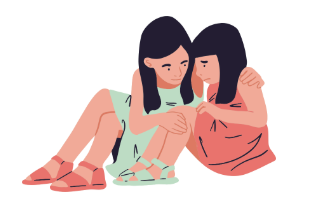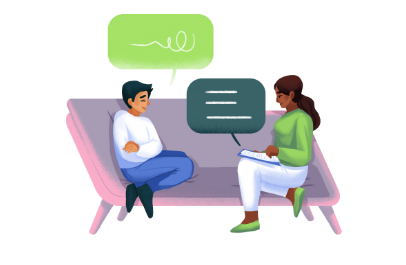The Effect of Domestic Abuse on Children
Back to news“I know we are young, and we do think sometimes that what we say does not matter, but it does matter. You only need to speak up to the adequate people. It is crucial to do this in order to achieve what we are aiming for.”

The first ever Children's Mental Health Week took place in 2015 and was launched to on the importance of children and young people's mental health.
The week was designed to encourage more people to start talking, spread the word and raise money to help fund services to support children's mental health.
As well as to make sure anyone struggling knew they were not alone.
In order to feel safe and comfortable with what we have around, it is important to share thoughts, as this will help to learn as same as to teach others.

1) Description of how mental health can affect, children's mental health by domestic abuse.
There are different ways in which domestic abuse can effect children's mental health. Studies declare that there are many ways in which a child can be targeted, not only being targeted directly affects them can also be that this individual, child was in the same room and they were able to witness how their loved one is being harmed can intensify their feelings of insecurity and fear.
This an also affect their mental health in a bad manner. Statistics say that a 90% of children are in the same room next to where the domestic violence has occurred, and a 62% will have been directly abused.
As children that live in the same house in which domestic abuse it is going on, they may have to face lack of support from their parents or caregivers. Legally it is declared that children that are directly or indirectly living in the same property, are considered to be subjected to child abuse.
A child brain can be influenced by positive and negative experiences at key stages, such as 0-5 and 12-25 years. Early stage, play a crucial role, in how the child stats thinking, and what believes this obtains from the cases in which this has been involved.
These are some mental health problems in children:
- Aggressive, disruptive, bullying and challenging behaviour
- Anxiety, fear and depression
- Withdrawal and an inability to interact with others
- Mood swings
- Suicidal feelings
- An inability to form a bond with one of more parent or caregiver
- Declining performance at school and truancy
- Harming or threatening to harm pets
- Self-harming and eating disorders
- Difficulty sleeping, nightmares and bed wetting
- Vandalism
- Drug and alcohol abuse
2) There are many ways to be supported.
The Wish Centre:
We are a charity focused on preventing abuse, assuring to support children and young people aged 6-19. Take a look at our young people's programmes here: https://www.thewishcentre.org/...
Key services that they provide: refuge facilities, volunteer opportunities, specialised programs, support for victims and other additional resources such as psychotherapy, provide information for young people.
Their goal is to prevent child abuse and neglect, ensuring that children grow safe and happy. this organisation ensures to protect children, support families, and also ensure to raise awareness.
Key services that they provide: They have a helpline available for 24/7, child protection service, education and awareness, research and advocacy, volunteer opportunities, and other additional resources such as campaign, online resources, etc.
The Samaritans are committed to child safety ad well being. They promote the welfare of children and young people, ensuring that all staff and volunteers are trained, having experience.
Key services that they provide are 24/7 helpline, support for vulnerable group, training and awareness, community outreach, partnerships and other additional resources such as online support, campaigns, etc.
Other organisations that provide support for children experiencing or witnessing domestic abuse are Childline, NAPAC, The Children’s society, Barnardo’s, etc.
By Ujala Tassawar Muhammad
